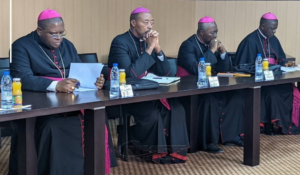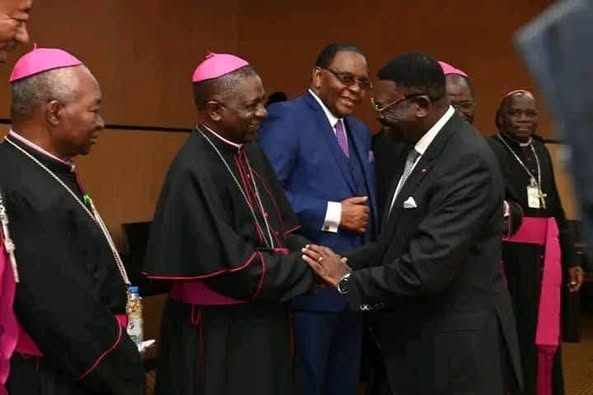Cameroon Bishops Meet Ngoh Ngoh Amid Growing Concerns Over Biya’s Elusive Leadership
By Andre Momo, BaretaNews
August 13, 2025
In a recent visit to the Presidency in Etoudi, a delegation of Catholic bishops from Cameroon met with Ferdinand Ngoh Ngoh, the Secretary General at the Presidency, instead of President Paul Biya. This encounter, part of a recurring pattern, has intensified public skepticism about the visibility and capacity of the 92-year-old leader, who is being positioned as the Cameroon People’s Democratic Movement (CPDM) candidate for yet another term in office.
While the government continues to portray Biya as an active and engaged leader, the reality for many who seek an audience at the Presidency tells a different story. Visitors, including prominent figures like these bishops, are routinely met by Ngoh Ngoh, engaging with little more than the President’s image rather than the man himself. This latest meeting was no exception, further fueling perceptions of an “invisible presidency” where key decisions and interactions are managed by intermediaries.
The absence of Archbishop Samuel Kleda of Douala from this meeting was particularly striking. Known for his outspoken criticism of Biya’s prolonged tenure, Archbishop Kleda has consistently challenged the government’s handling of systemic issues such as poverty, corruption, and underdevelopment. The Catholic Bishops’ Conference, under his influence, has repeatedly called for leadership renewal to address Cameroon’s deepening challenges, questioning whether Biya’s extended rule serves the nation’s progress.

For many Cameroonians, the bishops’ meeting with Ngoh Ngoh rather than Biya underscores a growing disconnect between the Presidency and the people. The Catholic Church, a significant moral and social force in Cameroon, has historically played a role in advocating for justice and accountability. Yet, the inability of even such influential figures to meet directly with the President raises questions about the accessibility and effectiveness of the current leadership.
Public frustration is palpable, with many mocking the notion that high-profile delegations must settle for discussions with Ngoh Ngoh while Biya remains elusive. “If even our bishops cannot see the President, who can?” asked a Yaoundé resident, reflecting a sentiment shared across the country. This pattern not only undermines the credibility of the Presidency but also deepens doubts about Biya’s capacity to lead as he campaigns for another term.
As Cameroon grapples with economic stagnation and social unrest, the absence of direct engagement from the President, coupled with the exclusion of vocal critics like Archbishop Kleda, paints a troubling picture of a leadership increasingly detached from its people. For many, this meeting symbolizes not just a missed opportunity for dialogue but a broader crisis of governance in a nation yearning for change.




